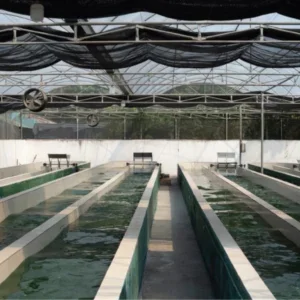
Chocolate is one of the world’s favourite products, but its popularity masks a long and complex supply chain for its key ingredient – cocoa. In Europe, chocolate comes in myriad forms, and is on sale in every supermarket, convenience store and sweet shop – but consumers rarely think about how it is made or where the cocoa that gives it its flavour is grown. If they did, many would be surprised that it is not grown on large plantations run by multinational corporations but instead is usually the product of small family-owned farms in the developing world.
Of the estimated four million tons produced globally every year, around 70% originates in West Africa – mainly from Ivory Coast and Ghana but also from Cameroon and Nigeria. Production in the Americas is rising, with Ecuador and Brazil among the key sources. The third-most-productive region is Asia, although Indonesia is the world’s third-largest producer. In all of these countries, as well as Papua New Guinea, Malaysia, Colombia and Mexico, there are many challenges facing small farming operations, which often tend to rely heavily on cocoa as their single crop.
"It is estimated that there are five million family farms producing cocoa, and, it is clear that many of these operations are very small," says Isabelle Adam, general secretary of the European Cocoa Association (ECA). "The work is often done by family members, and it is very labour-intensive and conditions are often pretty harsh."
"We encourage farms to diversify so that they are less dependent on one crop, and we work with the industry to help with the challenges they face, such as the poor condition of roads in Africa," she continues. "It is often hard to access the farms. There is a very long and complex supply chain with lots of middlemen between the farmers and the exporters. To improve sustainability in the industry, this is another issue that we must address."
On the ground
The ECA is a trade association, the members of which are the major companies involved in cocoa bean trading, processing, warehousing and related logistical activities in Europe. Its membership represents two thirds of Europe’s cocoa bean grinding business, half of Europe’s industrial chocolate production, and 40% of the world production of cocoa liquor, butter and powder.
The organisation’s role is to monitor and report on regulatory and scientific developments that affect the industry, and to represent its members in European and international forums on sustainability.
Global cocoa production is rising at a rate of around 3% a year in a market where demand is relatively stable but in which price can be extremely volatile. Political instability in Ivory Coast in the past has, for instance, had a huge impact on supply and therefore on price.
Challenges to productivity mean there is a need to focus on good agricultural practices, but sustainability entails long-term security of supply, and, therefore, the industry must also focus on ensuring that the right social infrastructure is in place to improve the economic benefit to small farmers, and to deliver the amenities that lead to the stability and health of local communities.
"In terms of productivity and quality, the plants that produce cocoa are very sensitive to pests and disease; good practices like pruning and weeding are essential to reduce losses," says Adam.
"Even though the plots of land being farmed are very small, around 30% of produce is lost each year because of poor agricultural practices. Also, the trees are old, especially in Africa, so their yield is decreasing."
"There are many rural development issues to address, too, not least access to schools and healthcare. We are dealing with communities that need education in matters of health, particularly in relation to HIV infection in Africa.
"However, along with the challenges there are also opportunities: cocoa is a very attractive crop, and the activity in a major producing country will often draw in farmers from neighbouring countries.
"It is a product that is relatively immune to economic recession, as people continue to eat chocolate even when times are hard," she adds.
Certified success?
There are many initiatives in place – among them the Fairtrade Initiative, the UTZ Certified scheme, Rain Forest Alliance and the Mars Sustainable Cocoa Initiative – that aim to give small farmers a fairer deal. Often subsidised by corporate partners, these certification schemes have been shown to benefit the communities they touch.
Though they have achieved a high profile at the consumer end of the supply chain – thereby raising awareness of the need for sustainability in the cocoa industry – so far, they have achieved only limited penetration of the market at the production end.
"These certification initiatives remain niche," says Adam. "It is estimated that only about 10% of global production is covered, though they do tend to result in shorter supply chains.
"Different schemes help to varying degrees, and there is a lot of competition between them, but what they are good at is raising awareness and also increasing the traceability of cocoa beans.
"They are by no means a panacea, and cases have been reported where cocoa produced under such schemes has not been sold as certified."
"Sometimes, we also see cooperatives getting their production double or triple-certified," she continues. "The criteria for these schemes are similar, so it is possible for a cooperative to apply for more than one certification and hedge according the premiums paid.
"This makes it all the more difficult to assess the exact volumes of cocoa that is produced under the schemes. The intentions of the schemes are good, but none of them have a perfect system," she adds.
The cocoa family affair
While no certification initiative is flawless, overall, their efforts have helped to pioneer meaningful change on the ground, and have improved the economic and social well-being of many small farming operations.
They have also played some part in raising awareness among consumers in the Western economies of the conditions under which cocoa is produced. The competition between different schemes, however, may have been problematic.
"The industry is looking at the possibility of starting to pool its resources in regard to these initiatives, and there is growing recognition that it requires more than just good agricultural practices; social issues are just as important. There is a lot of effort to ensure that no children are working in the industry, and that children in farming families have access to schools and healthcare.
"There is the will to bring these issues together and to work closely with the governments in the producing countries, notably by aligning with their national cocoa plans. The industry can also play a big part in community development," explains Adam.
The ECA’s role at the level of the European Union is crucial in helping the industry to find long-term, sustainable solutions to the social and economic challenges it faces. It has fostered support for the view that public-privates partnerships are the way forward and has worked with partners on the ground in producing countries to understand the problems small farmers face. At the other end of the chain, it is providing input to the European institutions to ensure they understand the reality of cocoa farming and to help the sector deal with potential regulatory threats.
"It is important that, when food safety regulations come into force, a transition period is foreseen to allow small farmers at the other end of the chain to adapt," says Adam. "There is a lot of focus on food safety and quality, and on labour conditions, but we have to bridge the gap between Western standards and the culture of the countries that produce cocoa.
"On some family farms there are occurrences of children helping out at peak time. We need to ensure children’s rights are protected while being mindful not to be patronising. You can’t just tell farmers what they can and can’t do," she adds.
"There can be a huge gap between what well-intentioned consuming countries want and what producing countries expect, and we have to work with all stakeholders rather than simply imposing Western standards."
Efforts to promote sustainability cannot come across as cultural imperialism, so the long road ahead must be travelled slowly, moving all stakeholders – from chocolate manufacturers and trading companies through to the governments of producing nations and the family farms themselves – towards meaningful change at a realistic pace.
The ECA plays a key role in engaging all of those stakeholders, and will continue to engage with regulatory bodies and political entities – in Europe and across the producing nations – to ensure that they all head in the same direction towards the same goal.





